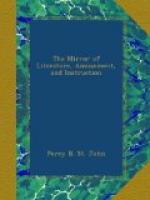* * * * *
THE PRINCE OF WALES AND MRS. FITZHERBERT.
He had now formed an attachment of no common kind to a lady, whose name at this period came frequently before the public associated with his. A veil of ambiguity or mystery covered, and still covers, the relations of the Prince of Wales with Mrs. Fitzherbert. She received all the respect and exercised all the influence which could belong to rank, character, accomplishments, and manners, in the highest class of society in this country daring her intimacy with the prince, and after their separation; and she is still living, surrounded, in her advanced years, with all the consideration which could do honour to the decline of a life the most estimable. Mrs. Fitzherbert was first married at sixteen, and had still all the graces of beauty and youth on the death of Colonel Fitzherbert. She was brought up abroad, with every advantage of a costly and consummate education. Her beauty had that soft and touching character, the result of fair complexion and blue eyes which distinguishes Englishwomen abroad, and obtained her the appellation of the angelic English blonde. The cousin of Lord Sefton, and related to other distinguished families, she lived in a sphere of society in London which necessarily made her acquainted with the Prince of Wales. He became enamoured, declared his passion, and was the cause of her retiring to the continent to avoid his importunities. Having remained abroad about three years, she returned to England in 1784. The prince on her return declared the continuance and repeated the sincerity of his attachment, with, it would appear, more success. Their intimacy for some time was known only to the initiated in high life; they moved and met in the same society, apparently on terms rather of formal than familiar acquaintance. The secret was divulged shortly before the prince’s quarrel with the king, and base advantage was taken of it to wound the private feelings of the prince where manly feelings are the most vulnerable. She was of a Catholic family, herself a Catholic; and this was easily turned against the Prince of Wales, at a period of religious bigotry, and political alarm, especially in the mind of George III.—Ibid.
* * * * *
A GREAT SLEEPER.
The Stadtholder, who had recently fled from Holland, was also the prince’s guest, and afforded amusement by the whimsical incongruity with which he chose his occasions for going to sleep. The princess commanded a play for his entertainment: in spite of her vivacity and utmost efforts, he slept and snored in the box beside her, and was roused with some difficulty when the curtain fell. A ball having been given in compliment to him at the Castle-tavern, he fell asleep whilst eating his supper, and snored so loud as to disturb the harmony of the orchestra and the decorum of the assembly. His Dutch highness was also entertained, if the term in this instance be admissible, with a grand masquerade, and was perplexed by the difficulty of resolving in what dress or character he should attend it. The Prince of Wales said he might go as an old woman.—Ibid.




